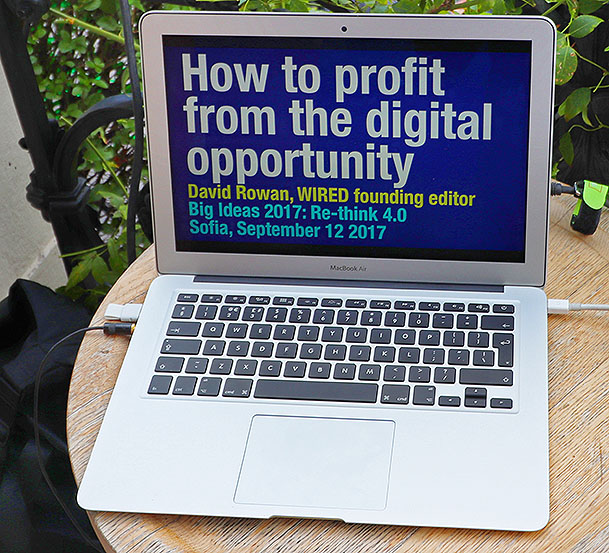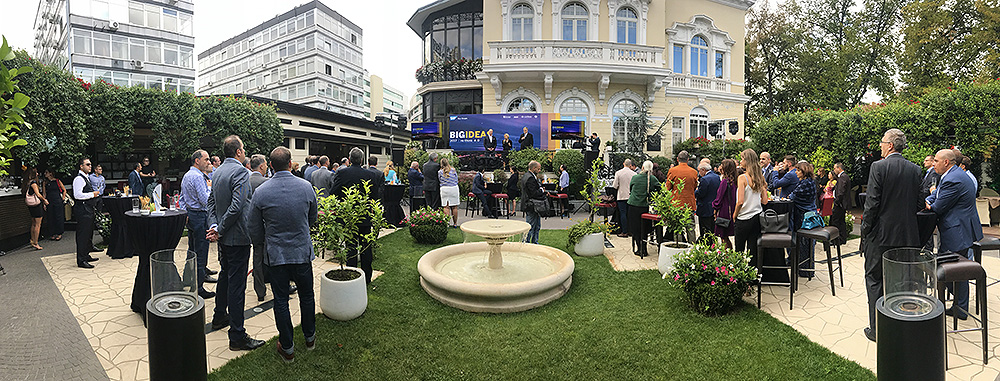Last week, I was invited to present the latest opportunities and challenges of Digital Transformation at the SAP Big Ideas executive evening event in beautiful Sofia, Bulgaria.

 Rumyana Trencheva, Managing Director for SAP South East Europe kicked off the event, and there was a short speech from the brand-new German Ambassador to Bulgaria, Herbert Salber (he had started his role just four hours earlier, and this was his first official act!).
Rumyana Trencheva, Managing Director for SAP South East Europe kicked off the event, and there was a short speech from the brand-new German Ambassador to Bulgaria, Herbert Salber (he had started his role just four hours earlier, and this was his first official act!).
David Rowan, Editor-at-large for Wired Magazine UK then explained how to profit from the digital opportunity, with lots of real-world examples gathered from his interviews of technology pioneers around the world.
His big message was that digital change is real and happening faster than most of us realize. Exponential change — such as the dramatic falling cost of data storage, the price of solar electricity, the adoption of bitcoin, DNA sequencing and more — is threatening business models everywhere.
Incumbents must take proactive action, investing in defensive “moats” of data that give them a head-start on the trends of tomorrow.
For example, Facebook acquired a startup called Onavo. It’s an application that helps you keep track of your mobile data use. But as a result, it also knows how apps are being used, and which apps are trending — so if, say, a HouseParty app starts taking off, Facebook can be quick to provide the functionality themselves.
And Orbital Insight is a satellite intelligence startup that (among other things) tracks the numbers of cars in 250,000 parking lots of 96 retailers. They were able to sound alerts about possible problems at JC Penny long before the company announced bad results — and perhaps even knew about the problems before JC Penny itself!
To succeed in the future, corporate culture is essential. Nokia started life as a tyre company, then evolved to sell paper, then electrical devices, then small electronics, and then quickly became the most popular phone company in the world. But at that point complacency set in, and they were notoriously dismissive of the introduction of the first iPhone a decade ago.
Over drinks, I discussed with David why some companies seem complacent in the face of so much change. He believed that it’s partly because most people haven’t had the opportunity to see the changes first hand: “I think everybody should try to spend some time in China — when you see what’s happening there, you’ll be more eager for change!”
Companies need to invest in constant change, using ideation to ask themselves the question “how can we be the kind of company that eats ourselves?” Appropriately-sized failures must be encouraged — and the lessons learned even celebrated with champagne!
The big danger, according to David, is “innovation theatre” — islands of innovation implemented as a thin veneer on the same old corporate organizations and processes. While each of these initiatives can provide some value, they can also slow down real innovation, by masking the need for more fundamental change.
One way to combat this — and to succeed with real transformation, rather than just implementing technology — is to align your organization and your employees around a clear mission, to concentrate on “building something meaningful”.
My presentation was on how SAP itself is “innovating with purpose”, with SAP Leonardo, a new digital innovation system designed to help our customers such as Stara innovate at scale and confidently redefine their business.
Overall, it was a great event, and I look forward to going back!


